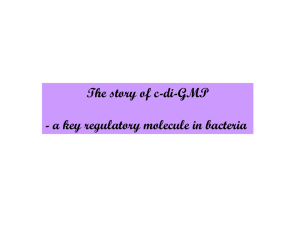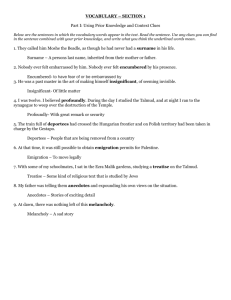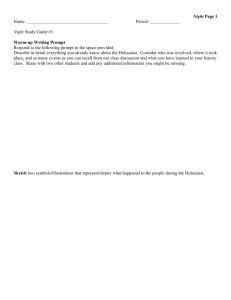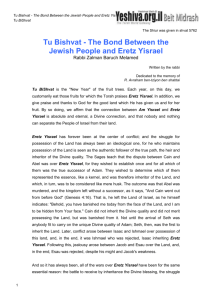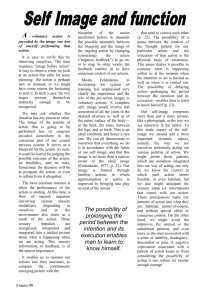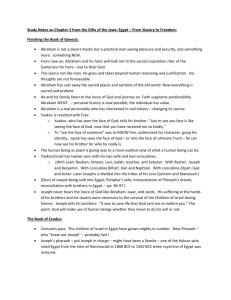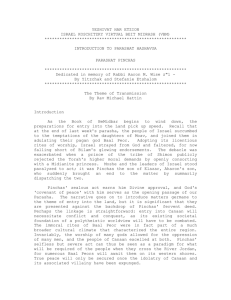Material and Spiritual Arrogance
advertisement
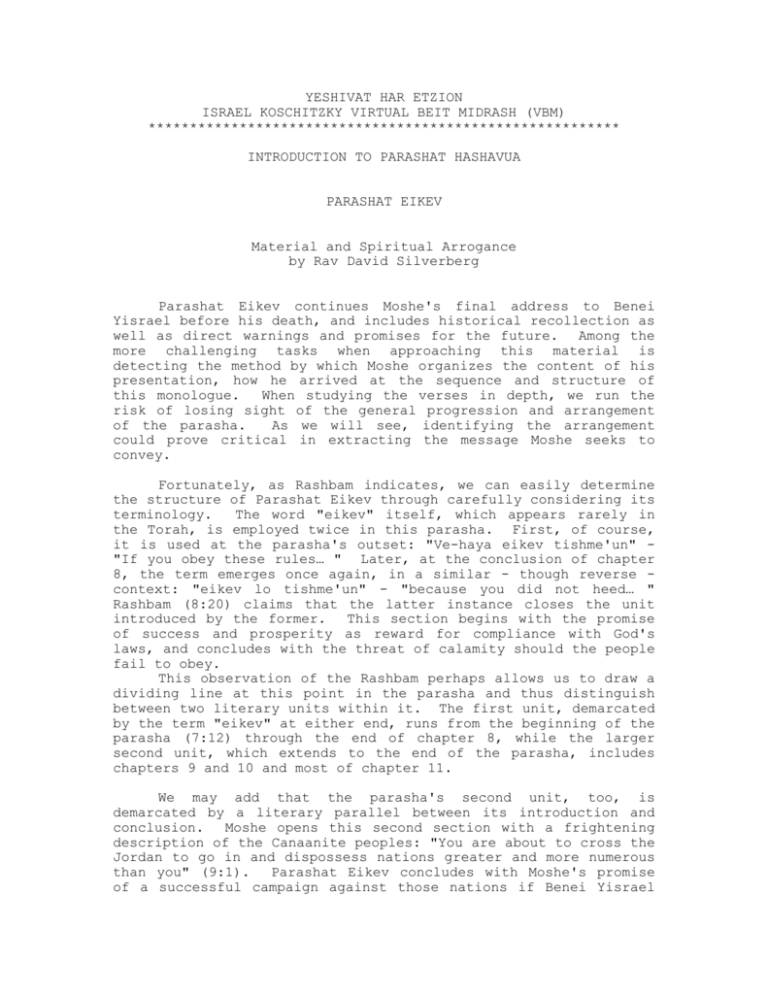
YESHIVAT HAR ETZION ISRAEL KOSCHITZKY VIRTUAL BEIT MIDRASH (VBM) ********************************************************* INTRODUCTION TO PARASHAT HASHAVUA PARASHAT EIKEV Material and Spiritual Arrogance by Rav David Silverberg Parashat Eikev continues Moshe's final address to Benei Yisrael before his death, and includes historical recollection as well as direct warnings and promises for the future. Among the more challenging tasks when approaching this material is detecting the method by which Moshe organizes the content of his presentation, how he arrived at the sequence and structure of this monologue. When studying the verses in depth, we run the risk of losing sight of the general progression and arrangement of the parasha. As we will see, identifying the arrangement could prove critical in extracting the message Moshe seeks to convey. Fortunately, as Rashbam indicates, we can easily determine the structure of Parashat Eikev through carefully considering its terminology. The word "eikev" itself, which appears rarely in the Torah, is employed twice in this parasha. First, of course, it is used at the parasha's outset: "Ve-haya eikev tishme'un" "If you obey these rules… " Later, at the conclusion of chapter 8, the term emerges once again, in a similar - though reverse context: "eikev lo tishme'un" - "because you did not heed… " Rashbam (8:20) claims that the latter instance closes the unit introduced by the former. This section begins with the promise of success and prosperity as reward for compliance with God's laws, and concludes with the threat of calamity should the people fail to obey. This observation of the Rashbam perhaps allows us to draw a dividing line at this point in the parasha and thus distinguish between two literary units within it. The first unit, demarcated by the term "eikev" at either end, runs from the beginning of the parasha (7:12) through the end of chapter 8, while the larger second unit, which extends to the end of the parasha, includes chapters 9 and 10 and most of chapter 11. We may add that the parasha's second unit, too, is demarcated by a literary parallel between its introduction and conclusion. Moshe opens this second section with a frightening description of the Canaanite peoples: "You are about to cross the Jordan to go in and dispossess nations greater and more numerous than you" (9:1). Parashat Eikev concludes with Moshe's promise of a successful campaign against those nations if Benei Yisrael observe the commandments. In this promise, Moshe employs parallel terminology: "… the Lord will dislodge before you all these nations: you will dispossess nations greater and more numerous than you" (11:23). Additionally, in introducing this section, Moshe cites the common question asked concerning the powerful nations of Canaan: "Who can stand up to the children of Anak?" (9:2). In the parasha's final verse, Moshe promises, "No man shall stand up to you." We may, therefore, suggest that Parashat Eikev consists of two distinct units, the second of which begins with chapter 9 and continues through the end of the parasha. We now turn to the more difficult task of justifying this breakdown by identifying the specific theme of each of the two units. We will do this with the help of three contrasting parallels between the two sections. These parallels underscore the difference in focus and orientation between the two units, helping us to determine the independent message of each. Selective Historical Review In our shiur two weeks ago on Parashat Devarim, we argued that in his historical review in that parasha, Moshe carefully selects those events from the wilderness period that best reflected the specific message he wished to transmit. We will employ this same method in our assessment of Parashat Eikev: the historical content of each of the two sections can perhaps help us identify their respective themes. In the first section, Moshe urges the people to recall the wonders and miracles of Egypt (7:18-19), which he enlists to answer his own rhetorical question, "These nations are more numerous than we; how can we dispossess them?" (7:17). He then focuses on Benei Yisrael's miraculous existence through the wilderness, the supernatural protection and sustenance afforded to them under the least hospitable conditions possible: Remember the long way that the Lord your God has made you travel in the wilderness these past forty years… He subjected you to hunger and then gave you manna to eat… in order to teach you that man does not live on bread alone, but that man may live on anything that the Lord decrees. The clothes upon you did not wear out, nor did your feet swell these forty years. Later Moshe emphasizes the danger of forgetting these two miracles - the Exodus and the divine protection in the wilderness (see 8:14-16). In the second section, Moshe recounts mainly Benei Yisrael's wrongdoing in the wilderness. He focuses not on God's miracles but on the people's disobedience: Remember, never forget, how you angered the Lord your God in the wilderness: from the day that you left the land of Egypt until you reached this place, you have continued defiant toward the Lord. (9:7) The bulk of this section (9:8-10:11) is devoted to the sin of the golden calf, though it includes a brief reference to three instances of Benei Yisrael's inappropriate grumbling (9:22) and the sin of the spies (9:23). Moshe then summarizes: "As long as I have known you, you have been defiant toward the Lord" (9:24). (Moshe does briefly mention the Exodus and splitting of the sea later in the parasha - 11:3-4; later we will address those verses.) The Agricultural Promise and Threat of Eretz Yisrael The second contrasting parallel relates to Moshe's depiction of the Land of Israel in the two units. In the first unit, Eretz Yisrael offers the nation the ideal conditions for agricultural development and prosperity: For the Lord your land with streams plain and hill; a and pomegranates, where you may eat nothing. (8:7-9) God is bringing you into a good land, a and springs and fountains issuing from land of wheat and barley, of vines, figs a land of olive trees and honey; a land bread without stint, where you will lack A much different picture emerges from this parasha's second unit, which emphasizes the country's lack of reliable water sources: For the land that you are about to enter and possess is not like the land of Egypt from which you have come, where you plant your seed and water by foot like a vegetable garden; but the land you are about to cross into and possess is a land of hills and valleys and drinks water from the rains of heaven. (11:10-11) Although Rashi explains these verses as expressing the land's quality which surpasses that of Egypt, virtually all other commentators (Ramban, Ibn Ezra, Rashbam, Chizkuni and Seforno, to name just a few) take the opposite approach. Unlike Egypt, which benefits from the constant supply of water made available by rivers and springs, the hill country of the Land of Israel has few natural water sources and does not lend itself to irrigation. This land therefore depends solely on the winter rains, without which no one can survive there. Moshe then concludes by describing the land as "a land which the Lord your God looks after, on which the Lord your God always keeps His eye, from year's beginning to year's end" (11:12). Divine providence is directly felt in Eretz Yisrael, since He alone possesses the key to rainfall, and hence He alone determines the viability of living in this land. This theme continues in the subsequent verses, which form the section known to us as the second paragraph of the daily recitation of "shema" (11:13-21). There Benei Yisrael are told that rainfall will hinge on their obedience: If you obey the commandments… I will grant the rain for your land… Take care not to be lured away to serve other gods… For the Lord's anger will flare up… and He will shut up the skies so that there will be no rain." (11:13-17). Two Forms of Arrogance The third and most revealing contrasting parallel between the two units of Parashat Eikev involves the different spiritual concerns Moshe expresses. In the first section, Moshe foresees a prosperous people attributing their wealth and success to their own skill: "Beware lest your heart grow haughty and you forget the Lord your God… and you say to yourselves, 'My own power and the might of my own hand have won this wealth for me'" (8:14,17). Moshe then predicts even more catastrophic consequences of this "forgetting": "If you forget the Lord your God and follow other gods… I warn you this day that you shall certainly perish" (8:19). Seforno and others explain that foreign worship results from the sense of absolute self-sufficiency described in the earlier verse. Once the nation denies their reliance on the Almighty in their material pursuits, they have taken a significant step closer to paganism, which deifies the natural forces themselves and denies the existence of a single, divine force governing them. In this unit, then, Moshe urges Benei Yisrael to acknowledge God's indispensable role in their success, and never to grant themselves full credit for their achievements. The second sections tells of a different concern: "When the Lord your God has thrust them from your path, say not to yourselves, 'The Lord has enabled us to possess this land because of our virtues'" (9:4). Moshe urges the people to instead realize that "It is not because of your virtues and rectitude that you will be able to possess their country; but it is because of their wickedness that the Lord your God is dispossessing those nations before you, and in order to fulfill the oath that the Lord made to your fathers… " Here, Benei Yisrael afford the Almighty full credit for their success (in this instance military success, whereas the previous section dealt with economic prosperity). However, their theological assessment of His assistance is what troubles Moshe. Reminding Benei Yisrael of their frequent defiance in the wilderness, Moshe bids them to acknowledge that they do not deserve God's miraculous intervention on their behalf. Whereas in the first unit Benei Yisrael mistakenly attribute their success to their independent capabilities, in the second they correctly attribute it to God's assistance - which they mistakenly ascribe to their piety. Section 1: The Challenge of Natural Success Let us now return to each of the two units and analyze the independent theme of each. In the first section, Moshe alerts Benei Yisrael to the new challenge that awaits them in Canaan, a challenge fundamentally different from the challenge of the wilderness. In the wilderness, Benei Yisrael had no realistic possibility of sustaining themselves, as Moshe emphasizes in this section. According to Rashbam (commentary to 8:2), this constituted the primary spiritual challenge of this period: living without any opportunity for self-sufficiency, going to sleep at night with nothing left for the following day besides God's promise. This experience impressed upon Benei Yisrael the basic tenet that God alone determines life and death, He alone controls man's fate. That God could sustain two million people through an arid desert for forty years proves that He ultimately is the one who sustains all people at all times. Moshe therefore invokes this miraculous existence in the wilderness to prepare Benei Yisrael for the opposite challenge they will soon face in Canaan: retaining one's dependence on God even when success appears to come naturally. When the soil of Eretz Yisrael yields its fruit, as described in this section, and the nation grows and prospers, they are liable to forget the God who poured manna from the skies every morning. When one sleeps at night with bread in his cupboard and warehouses filled with grain, a natural sense of pride and self-achievement threatens to blur his submissive awareness of God's power. Moshe therefore warns, "Remember that it is the Lord your God who gives you the power to get wealth in fulfillment of the covenant that He made on oath with your fathers, as on this day" (8:18). Abarbanel explains the verse's final clause, "as on this day," as a direct reference to Benei Yisrael's present reality. Just as "on this day," when Benei Yisrael still lived off heavenly bread and were encircled by the clouds of glory, they could not possibly attribute their sustenance to their own efforts, so must they always acknowledge their absolute dependence on the Almighty even when they till the land and harvest the fruit they themselves had planted. Similarly, at the parasha's outset, Moshe invokes the miracles of the Exodus as a precedent for the guaranteed victory in Canaan. Recall that towards the end of Parashat Devarim, Moshe points to the triumph over Sichon and Og as a source of encouragement as the nation prepares for combat with the Canaanites. Here, however, he draws not upon the natural warfare of that battle, but rather God's victory over Egypt, where Benei Yisrael played no active role in their redemption. That experience, where the powerless slave nation could do nothing but rely on God for salvation, must teach Benei Yisrael that even when they take up arms to fight the armies of Canaan - it is God alone who brings them victory. Section 2: The Threat of Complacency As discussed, towards the beginning of the second unit of Parashat Eikev Moshe warns against self-satisfied piety. He elaborately describes their constant defiance throughout the forty-year period, proving his case against their worthiness. What practical message does Moshe seek to convey by reminding Benei Yisrael of their previous misdeeds? What difference does it make whether they entered the land on their own merits or only due to God's promise to the patriarchs? Rav Shimshon Refael Hirsch explained that whereas the divine oath guaranteed Benei Yisrael's entry into the land in spite of their intransigence, it did not preclude banishment from the land at a later time. They cannot conduct their religious life with a complacent self-assurance and under the confident presumption that their continued prosperity - or even survival in the land is guaranteed. The Netziv explains this section somewhat differently, focusing on Benei Yisrael's inconsistency and fickleness exhibited in the wilderness. Moshe here reminds the people that they have yet to achieve instinctive piety, which would allow for a comforting sense of self-assurance. In particular, the sin of the golden calf, on which Moshe elaborates in great detail in this section, demonstrates the ease with which a nation can plummet from sanctity to iniquity. Just several weeks after beholding God's Revelation at Sinai, Benei Yisrael "have been quick to stray from the path that I enjoined upon them" (9:12). They thus cannot feel confident with their religious stature; hard work and concentrated effort is required for them to earn the privilege of living in the Promised Land. According to both these approaches, Moshe's concern here involves the nation's complacency and unwarranted selfconfidence. Even once they acknowledge that God gives them "the power to get wealth," they may mislead themselves into presupposing their worthiness to receive that power. In several instances throughout this discourse, Moshe describes Benei Yisrael as "keshei-oref" - "stiff-necked" (9:6,13,27; 10:17). Seforno (9:6) interprets this term as denoting an obstinate refusal to accept guidance or criticism, an insistence on one's own correctness and propriety. Moshe impresses upon the nation that in the Land of Israel they cannot survive with this arrogance, instead they must follow the honest, self-effacing pursuit of piety. This is a "land which the Lord your God looks after," whose population lives under His direct supervision and therefore relies on His favor and compassion to survive there. One could suggest that herein lies the significance of Moshe's specific reference in this section to God's miracles in Egypt and the punishment of Datan and participants in the rebellion of Korach: Aviram, two main You shall know this day that it was not your children, who neither experienced nor witnessed the punishment of the Lord your God… the signs and the deeds that He performed in Egypt against Pharaoh the king of Egypt and all his land… what He did to you in the wilderness before you arrived in this place, and what He did to Datan and Aviram… when the earth opened her mouth and swallowed them… but that it was you who saw with your own eyes all the great deeds that the Lord performed. (11:2-7) Many commentators understand this brief survey as emphasizing God's kindness to Benei Yisrael, particularly the deliverance from Egypt and "what He did to you in the wilderness" - sustaining them for forty years of desert travel. More convincing, however, is the approach of Abarbanel, who interprets these verses as referring specifically to divine punishment. (This debate involves the etymological issue of how to define the term "mussar," which introduces this passage and which we translated in our citation - based on Abarbanel - as "punishment.") "What He did to you in the wilderness," Abarbanel claims, refers not to the manna, as Ibn Ezra and Chizkuni explain, but rather to the various calamities Benei Yisrael suffered in the wilderness on account of their wrongdoing. Interestingly, however, Moshe chooses to single out the plagues in Egypt and the miraculous death of Datan and Aviram. Perhaps these two groups of sinners best embody the complacent, selfassured attitude against which Moshe warns in this section. Pharaoh consistently followed his own beliefs and thinking and would not allow the divine plagues to dissuade him. Ultimately, "the Lord rolled back upon them the waters of the Sea of Reeds… thus destroying them to this very day" (11:4). Similarly, Datan and Aviram brazenly challenged the authority of Moshe and felt themselves worthy of leadership. Recall the battle cry of Korach's revolt - "For the entire community - they are all sacred!" (Bemidbar 16:3). Benei Yisrael themselves witnessed the results of false, persistent, self-proclaimed Godliness. They must therefore avoid dangerous delusions of piety and exert themselves sincerely in the observance of God's laws. Parashat Eikev thus concerns itself with two manifestations of arrogance likely to plague Benei Yisrael once they settle the land. Moshe fears that the people will credit themselves with either the independent power or the religious worthiness of becoming successful and prosperous. He teaches that instead they must acknowledge both God's exclusive ability to provide their needs as well as His kindness in doing so. Appropriately, Parashat Eikev introduces the mitzva of birkat ha-mazon, the blessings to be recited after completing a meal (see 8:10). In birkat ha-mazon we express our recognition that God alone sustains the universe - "He gives bread to all flesh." Additionally, we proclaim that He does so "for His kindness is everlasting." Just as Benei Yisrael must acknowledge that they do not deserve to enter the land on their merits alone, so do we recognize that we are sustained only through God's kindness. The hopeful result of this recognition is described by Rav David Tzvi Hoffman (in his commentary to 9:6) as follows: "This awareness must spur them to be righteous, in order that they be deserving of this good land."
